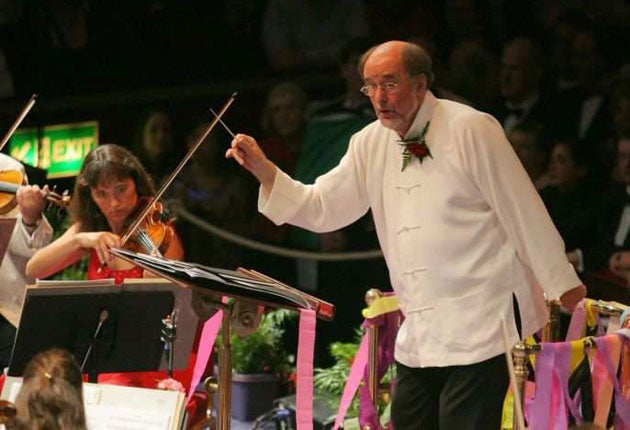Sir Roger Norrington 75th-birthday concert, Royal Festival Hall, London

Your support helps us to tell the story
From reproductive rights to climate change to Big Tech, The Independent is on the ground when the story is developing. Whether it's investigating the financials of Elon Musk's pro-Trump PAC or producing our latest documentary, 'The A Word', which shines a light on the American women fighting for reproductive rights, we know how important it is to parse out the facts from the messaging.
At such a critical moment in US history, we need reporters on the ground. Your donation allows us to keep sending journalists to speak to both sides of the story.
The Independent is trusted by Americans across the entire political spectrum. And unlike many other quality news outlets, we choose not to lock Americans out of our reporting and analysis with paywalls. We believe quality journalism should be available to everyone, paid for by those who can afford it.
Your support makes all the difference.One might have expected a better turn-out for Sir Roger's 75th-birthday bash, especially since the highly eclectic programme – spanning some three centuries of music – contained a little bit of something for everyone. But maybe the Classic FM approach was unwise for an event of this kind, and maybe Norrington himself is still too much of a connoisseur's delight, too much of a maverick, ever to pull in the big crowds. And that's quite an irony, given that there are few more erudite, entertaining, communicative, or influential musicians on the planet. He is, in every sense, a one-off.
Still, the great and the good were out in force, one or two of them – such as the wickedly acerbic Jonathan Miller – offered testimonials, and two of Sir Roger's regular orchestras were on hand to share the performance honours: the Orchestra of the Age of Enlightenment, and the Stuttgart Radio Symphony Orchestra, along with the Schütz Choir of London, with whom Norrington cut his choral teeth.
Norrington's immense influence in the matter of performing traditions and their continuity were, of course, at the centre of the evening's proceedings, with the period instruments of the OAE and the contemporary hardware of the Stuttgart Orchestra united through the big issue of style. The big pay-off of Berlioz' Le Corsaire was underlined with the characteristic Norrington "swivel" to the audience – the musical equivalent of "howzat!" And there was a lovely moment in the last movement of Beethoven's Eroica Symphony where the arrival of the theme in pizzicato brought a quizzical to-audience look which seemed to say: "Just you wait till you hear what Beethoven does with this!"
The sworn enemy of vibrato once again demonstrated how much fresher and purer music by romantics such as Brahms (the slow movement of the Fourth Symphony) can sound when expression is achieved through the honesty and mobility of the phrasing. And we all thought we were seeing things when Norrington indicated vibrato in the Adagietto from Mahler's Symphony No 5. We weren't. For two bars of the movement Mahler himself suggests it, "as an experiment". That's something I never knew. But with Norrington it's always fun learning. Many happy returns, Sir Roger.
Join our commenting forum
Join thought-provoking conversations, follow other Independent readers and see their replies
Comments